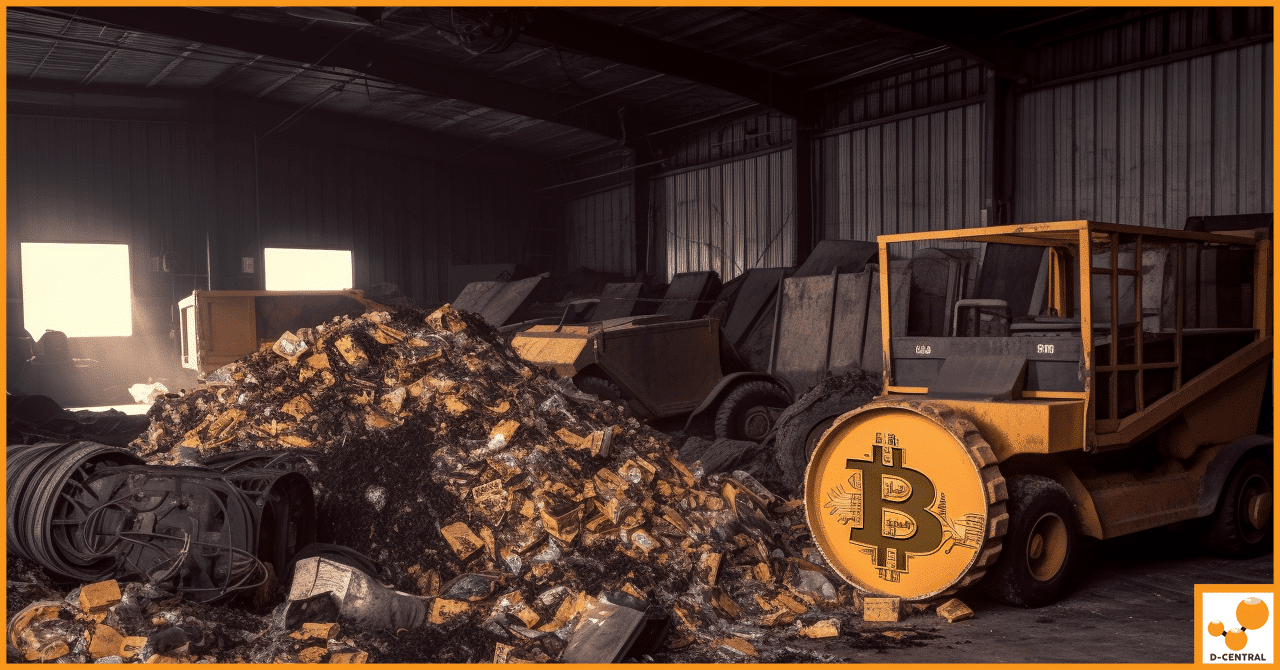
Maximizing Bitcoin Mining Efficiency: A Comprehensive Guide to Equipment, Techniques, and Collaborations
Welcome to the fascinating world of Bitcoin mining – a digital gold rush that holds significant value in today’s era
4479 Desserte Nord Autoroute 440, Laval, QC H7P 6E2

Recycling facilities are key players in reducing waste and promoting a circular economy. By collecting and processing various types of waste materials, they help conserve natural resources and reduce the environmental impact of waste disposal. However, these facilities require a significant amount of energy to operate, which can be costly and detrimental to the environment.
Enter Bitcoin mining, a process that generates a significant amount of excess heat as a byproduct. This excess heat has traditionally been considered a challenge for Bitcoin miners, as they need to employ cooling systems to maintain optimal mining efficiency and prevent damage to their equipment. However, with the growing demand for energy-efficient and sustainable solutions, there is increasing interest in finding innovative ways to utilize this excess heat.
One promising opportunity lies in harnessing the excess heat generated by Bitcoin mining for various processes in recycling facilities. By capturing and utilizing this heat, these facilities can significantly reduce their energy costs, increase their operational efficiency, and boost their profits. This article explores the potential of this innovative approach and its implications for both the Bitcoin mining and recycling industries. Join us as we dive deeper into this exciting topic and discover how sustainability and innovation can work hand in hand.
One significant byproduct of Bitcoin mining is the heat generated during the process, which can be detrimental if not managed properly. Furthermore, the disposal of heat waste can be energy-intensive, compounding the already high energy consumption associated with Bitcoin mining.
To address this issue, Bitcoin miners typically employ various cooling systems to maintain the temperature of their equipment. These solutions can range from simple air conditioning units to more complex liquid cooling systems. However, these cooling methods can be inefficient, consuming additional energy and generating even more heat in the process. This inefficiency increases operational costs for miners and exacerbates the environmental concerns surrounding the industry.
Fortunately, many Bitcoin miners have located in areas where the heat waste is not as much of an issue. Additionally, many of them are coming up with innovative solutions to use this considerable byproduct and monetize it. For example, some miners have partnered with greenhouses to provide heat for plant growth, while others have used the excess heat to power other industrial processes. These initiatives not only help reduce the environmental impact of Bitcoin mining but also provide additional revenue streams for miners.
Recycling facilities present a promising opportunity for utilizing the excess heat generated by Bitcoin miners. By capturing and transferring this heat to recycling plants, it can be used in various processes such as drying, melting, and sterilizing materials. This integration can be achieved through the installation of heat exchangers, which transfer the heat from Bitcoin mining equipment to the recycling facility’s systems. This innovative approach can create a symbiotic relationship between the two industries, with recycling facilities benefiting from the surplus heat and Bitcoin miners effectively managing their heat waste.
Utilizing the excess heat generated by Bitcoin mining in recycling facilities can significantly improve energy efficiency. By harnessing this otherwise wasted energy, recycling plants can reduce their dependence on external energy sources for various processes. This improved energy efficiency not only benefits the environment but also enhances the overall sustainability of both industries.
One of the primary advantages of using Bitcoin miners’ excess heat in recycling facilities is the potential for cost savings. By reducing their reliance on external energy sources, recycling plants can cut down on their energy expenses. Similarly, Bitcoin miners can save on cooling costs as the heat is transferred to recycling processes. This mutual cost-saving benefit makes the partnership between the two industries a financially viable solution.
By capturing and utilizing the excess heat from Bitcoin mining, recycling facilities can significantly reduce their carbon footprint. This reduction is achieved through the decreased consumption of fossil fuels and other non-renewable energy sources. Additionally, by effectively managing heat waste, Bitcoin miners can also reduce their environmental impact. This collaboration results in a more sustainable and eco-friendly approach for both the recycling and Bitcoin mining industries.
Recycling facilities around the world have begun to explore innovative ways to harness the excess heat generated by Bitcoin miners. Several success stories illustrate how this approach can reduce energy costs and improve environmental sustainability.
One example is a Swedish recycling facility that partnered with a local Bitcoin mining company to utilize excess heat for its paper recycling process. By using the heat to dry paper pulp, the facility reduced its reliance on external heat sources.
Another example is a Canadian aluminum recycling plant that integrated Bitcoin miners into its facility, using the generated heat to melt scrap aluminum. This approach significantly reduced the plant’s energy consumption and reliance on natural gas.
These recycling facilities have experienced numerous benefits from utilizing Bitcoin miners’ excess heat, including increased profits due to reduced energy costs and improved operational efficiency, enhanced environmental sustainability through reduced carbon emissions and energy consumption, and strengthened collaboration between the recycling and cryptocurrency industries.
These success stories offer valuable insights and lessons for other businesses considering this approach. Effective collaboration between the two industries is essential for the successful implementation of heat utilization systems. Thorough planning and investment in infrastructure, such as heat exchangers and efficient distribution systems, are necessary to capture and use the excess heat effectively. Ongoing monitoring and optimization of the heat utilization process can help maximize the benefits and ensure long-term sustainability.
Overall, the potential for other industries to explore similar partnerships with Bitcoin miners to utilize excess heat is significant. By doing so, these industries can increase their energy efficiency and reduce their environmental footprint, contributing to a more sustainable future.
While utilizing the excess heat generated by Bitcoin mining can provide several benefits, there are technical challenges that recycling facilities need to address to make this approach successful. These challenges include designing and installing efficient heat exchange systems, ensuring compatibility with existing infrastructure, maintaining optimal temperatures, and addressing potential cooling or heating needs.
Before implementing a heat utilization system, recycling facilities need to consider legal and regulatory requirements. This includes compliance with environmental regulations, obtaining necessary permits and approvals, addressing zoning restrictions, and adhering to industry-specific regulations.
While the long-term benefits of using excess heat from Bitcoin mining are significant, there are initial and ongoing costs to consider. These include upfront costs for equipment, potential modifications to the facility’s infrastructure, ongoing maintenance and monitoring expenses, and potential cooling or heating needs, which can result in increased operational costs.
However, successful examples of recycling facilities utilizing excess heat from Bitcoin mining demonstrate that with careful planning and investment, these challenges can be overcome. These efforts result in significant benefits for both the recycling and cryptocurrency industries, including reduced energy costs, improved operational efficiency, enhanced environmental sustainability, and strengthened collaboration between the two sectors.
Overall, while there are challenges to utilizing excess heat from Bitcoin mining, recycling facilities can mitigate them through careful planning, investment, and collaboration. By doing so, they can reap the rewards of reduced energy costs, improved environmental sustainability, and increased operational efficiency, contributing to a more sustainable future.
As the demand for sustainable and energy-efficient solutions continues to grow, there is a strong potential for innovation in heat capturing and distribution technology. These advancements may include more efficient heat exchangers, improved heat distribution systems, and the development of modular, scalable systems that can easily integrate with existing infrastructure.
The success of recycling facilities utilizing excess heat from Bitcoin mining demonstrates the potential for further collaboration between the recycling and cryptocurrency industries. Working together, they can share knowledge, optimize the heat utilization process, jointly develop innovative, eco-friendly solutions, and advocate for supportive policies and regulations that encourage sustainable practices.
The concept of utilizing excess heat from Bitcoin mining is not limited to recycling facilities. Other industries can explore similar partnerships and harness the surplus heat for various applications. Greenhouses and vertical farms can use the excess heat to maintain optimal temperatures for plant growth, while data centers can benefit from the excess heat to offset their own cooling requirements. District heating systems can incorporate excess heat from Bitcoin mining into their networks, supplying residential and commercial buildings with a sustainable heat source.
The potential for utilizing excess heat from Bitcoin mining is vast and can have a significant impact on various industries. It can promote energy efficiency, reduce reliance on external energy sources, and contribute to environmental sustainability. As the demand for sustainable solutions continues to grow, it is essential for industries to prioritize innovation and collaboration to achieve a more sustainable future.
Exploring creative ways to use excess heat from Bitcoin mining, both the cryptocurrency and recycling industries can contribute to a more sustainable future. These efforts not only benefit the environment but also provide a competitive edge for businesses that adopt eco-friendly practices.
The success stories of recycling facilities utilizing Bitcoin miners’ excess heat serve as an encouragement for further exploration and collaboration between the two industries. By working together, they can overcome the challenges associated with implementing heat utilization systems, share best practices, and develop new solutions that benefit both sectors. Moreover, expanding this concept to other industries can foster a broader movement toward energy efficiency and environmental sustainability, creating a positive impact on the global economy and the planet as a whole.
What is the problem with excess heat generation in Bitcoin mining?
Excess heat is a significant byproduct of Bitcoin mining, and it can be costly to manage and dispose of properly. It adds to the already high energy consumption of the mining process and increases operational costs for miners.
How can recycling facilities utilize the excess heat generated by Bitcoin mining?
Recycling facilities can capture and transfer the excess heat from Bitcoin mining equipment to their processes using heat exchangers. This heat can be used for various tasks such as drying, melting, and sterilizing materials, significantly reducing energy costs and increasing operational efficiency.
What are the benefits of utilizing the heat in recycling processes?
Using the excess heat from Bitcoin mining in recycling facilities improves energy efficiency, reduces costs, and lowers the carbon footprint. It also creates a symbiotic relationship between the two industries and promotes a more sustainable and eco-friendly approach.
Can you provide examples of successful collaborations between Bitcoin mining and recycling facilities?
Yes, there are several success stories, such as a Swedish recycling facility using excess heat to dry paper pulp and a Canadian aluminum recycling plant using the heat to melt scrap aluminum. These collaborations have resulted in increased profits, improved environmental sustainability, and strengthened collaboration between the recycling and cryptocurrency industries.
What are some challenges and considerations for implementing heat utilization systems in recycling facilities?
Recycling facilities need to address technical challenges such as designing efficient heat exchange systems and ensuring compatibility with existing infrastructure. They also need to comply with legal and regulatory requirements and consider upfront and ongoing costs for equipment, infrastructure modifications, and maintenance.
What are the future possibilities and opportunities in utilizing excess heat from Bitcoin mining?
As the demand for sustainable solutions grows, there is potential for advancements in heat capturing and distribution technology. This concept can be expanded to other industries, such as greenhouses, data centers, and district heating systems, offering a sustainable heat source and promoting energy efficiency.
DISCLAIMER: D-Central Technologies and its associated content, including this blog, do not serve as financial advisors or official investment advisors. The insights and opinions shared here or by any guests featured in our content are provided purely for informational and educational purposes. Such communications should not be interpreted as financial, investment, legal, tax, or any form of specific advice. We are committed to advancing the knowledge and understanding of Bitcoin and its potential impact on society. However, we urge our community to proceed with caution and informed judgment in all related endeavors.
Related Posts

Welcome to the fascinating world of Bitcoin mining – a digital gold rush that holds significant value in today’s era

Discover how to maximize your cryptocurrency mining efficiency and profitability by adapting your setup to your specific climate zone. Whether

Bitcoin mining, the process by which new bitcoins are introduced into circulation and transactions are verified and added to the